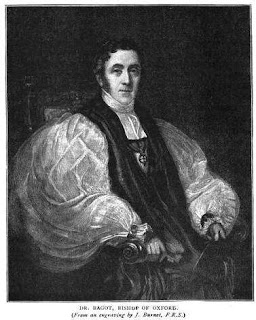"Definite and tangible": Bishop Bagot's 1842 Visitation Charge and Prayer Book piety
Here Bagot warns against undermining the "definite and tangible" catholic nature of the Prayer Book with devotional material from the Roman Breviary, in pursuit of an "indefinite and elusive ... shadowy Catholicism". This contrast - "definite and tangible" against "indefinite and elusive" - captures the differences between an Old High piety rooted in the Prayer Book, English divines, and parish over generations, and the first signs of the emergence of an artificial, ahistorical stream of Tridentine piety within Anglicanism:
Further I must take leave to tell those persons, whoever they are, that they are doing no good service to the Church of England, by their recent publication of manuals of private devotion, extracted from the Breviary and similar sources by inserting therein no small portion of highly objectionable matter, and tacitly, if not openly, encouraging young persons to be dissatisfied with what God has given them, and to look on the contents of our admirable Liturgy as insufficient to meet the wants of a Catholic mind. Be it ours, my Reverend Brethren, to remind the young and ardent of these days, that it is a most dangerous delusion to wander from any thing so definite and tangible as the Prayer Book, in search of what is so indefinite and elusive as that shadowy Catholicism, which, under the aspect represented by them, has never existed except in their own imaginations.




Looking forward to this series! Just recently discovered your blog and have been deeply enriched and blessed by your research. Blessings.
ReplyDeleteVery generous indeed: thank you.
Delete